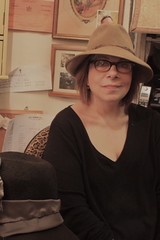For every East Village business that’s opening or closing, dozens are quietly making it. Here’s one of them: Barbara Feinman Millinery.
Before she opened her East Village hat shop, Barbara Feinman spent twenty years working office jobs. “I was raised to be a smart Jewish girl who went to college,” she said. “Those girls aren’t supposed to use their hands.” But she burned out on white collar work, took a class at FIT, and decided to become a hat maker. After initially working out of her kitchen, she opened Barbara Feinmen Millinery at 66 East Seventh Street in June of 1998. She recently told The Local how she has managed to make it to 14 years.
What prompted you to stop working out of your kitchen and seek a proper storefront?
I got a few big orders. One from Barney’s that was a $17,000 order. That was absolutely huge in the 1990s. After that I started sharing a studio space on Ninth Street. When I got a dog and wasn’t allowed to bring my dog to work, that really bugged me since what’s the point of working for myself if I can’t work how I want? That’s when I went solo. I walked around the East Village, saw a sign and walked in. It was walking distance from my home. I grew up around here. I feel most at home here. Plus, fourteen years ago there weren’t many places I could have afforded.
What was the rent when you moved in?
It was under $1,000 a month and it is still affordable today. I knew the landlord. He owns a number of buildings in the East Village. I knew he was a trustworthy, decent guy and that the rent was reasonable. I knew he wouldn’t turn around and gouge me. So I have a landlord on my side who is supportive of me as a small business. He doesn’t raise the rent more than I can afford. He hasn’t sold [the building] or torn it down.
Why else do you think he’s been so accommodating? Doesn’t he have to make money too?
I’m in the middle of the block, so the zoning might make it so there can’t be a coffee shop there. Also, it’s a small location. There aren’t that many other businesses that would want that size.
What are your biggest challenges as a business?
For me it is how do I sell enough stuff in such a small space, and how do I get the work done when it is handmade – I need to have people to help me.
What was your biggest boon year?
Overall it was 2008 – right before the axe hit. That was the end of that big bubble before all hell broke loose. People were spending money like I’d never seen before and then the recession hit. Prior to that there were months that should have been slow, but were still really great.
How is business for you now?
I’m doing okay right now. Things keep morphing and shifting. I supplement my handmade hats with lower-price things. I have $50 hats I purchase next to the $250 hats I make. Right now the higher-end stuff does better. People are appreciating things made locally more, especially because it has become so rare.
What have been your biggest burdens as a small business?
Mentally, I have that syndrome that an actor and a freelancer has, that feeling that you have to work really hard and sell it all now because you might go out of business tomorrow. You have dips in sales and you get scared and think it’s over. I’ve been living those cycles for a while, and I’m better now. I’ve learned to assume it is a cycle and it will end. I understand cycles better and don’t get as scared.
Also, the cost of materials has skyrocketed because of the world economy. There are raw materials I just can’t get. They are handmade and no one wants to make them anymore. When the ribbon guy is gone, I can’t get ribbon. When the felt guy goes under, there’s no one else to get felt from. It’s all in China. I can’t work with China because I’m not big enough.
Are you surprised a handcrafted hat shop is surviving in 2012, within this economy?
If it weren’t for the Internet we wouldn’t be in business. People come to town looking for me because they need a hat for something like a wedding. They will have found me because of searching the Internet. Online my presence has been huge. The Internet leveled the playing field so a small business can be just as prominent as the large ones.
Where do you think your business will be in five years?
I am looking at the people who are working for me and the people I might be hiring. I am hoping one person might want to be a senior partner so I can back off. They can make more and put more time in, and I can make less and put less time in. I don’t want to work as hard as I am now. This week I worked 10 to 12 hours a day for the whole week.
If you could afford it, what would your business have that it doesn’t already have?
I don’t have enough space. Hat making takes up a huge amount of space. The materials take up a lot of space. I would love to make big hats, but it’s tiny in there. My store and work room is less than 300-square-foot total.
What would you just as soon not have to deal with that the law perhaps rather unfairly requires that you do?
New York City double-taxes small businesses. The city has a very substantial tax for small businesses like mine and it’s not the same for big businesses. The city has all kinds of ways of getting money out of you.




